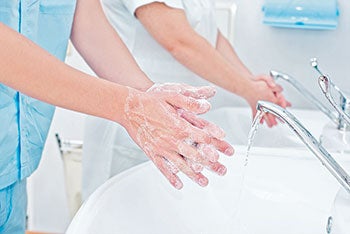Study: Caring for <em>C. difficile</em> patients will contaminate some staff
 |
| Correct hand hygiene by staff is the best defense against spreading C. difficile. Photo © freepeoplea/Fotolia.com |
One in four health care workers' hands were contaminated with Clostridium difficile spores after routine care of patients infected with the bacteria and before performing hand hygiene, according to a recent study published by the Society for Healthcare Epidemiology of America (SHEA).
Contamination of health care workers' hands occurred with high-risk contact that included washing patients, conducting a digital rectal exam or changing linen, the study shows.
The duration of high-risk contact also was a factor in hand contamination and was more common among nurse assistants than nurses or physicians, likely because nurse assistants had more high-risk contact than others.
While the study reveals that not wearing gloves also was a factor in hand contamination while caring for infected patients, it was not an absolute prevention either.
"Because C. difficile spores are so resistant and persistent to disinfection, glove use is not an absolute barrier against the contamination of health care workers' hands," says Caroline Landelle, lead author of the study, which was published in the January issue of Infection Control and Hospital Epidemiology.
Though it was not part of the study, Landelle says there are a couple of possible reasons why health care workers' hands became contaminated even while wearing gloves.
Workers may have contaminated their hands while removing their gloves, and gloves may not provide absolute protection against hand contamination because barrier protection could be compromised during use, she says.
Still, wearing gloves along with conducting hand hygiene with soap and water instead of an alcohol-based hand rub after glove removal is the best way to avoid contamination, the study notes.
"The best way to protect patients from the cross-transmission of microorganisms is to encourage health care workers to practice good hand hygiene during health care," says Christian Brun-Buisson, senior author of the study.
SHEA recommends that health care professionals clean their hands with soap and water after caring for patients with C. difficile infections in outbreak or hyperendemic settings and with an alcohol-based hand hygiene product in routine or endemic settings. The efficacy of these two products on C. difficile needs further evaluation.
According to its authors, the study is the first known to focus on the carriage of viable C. difficile spores on health care workers' hands. C. difficile exists in vegetative form, which is killed when exposed to air, whereas the spores are resistant to oxygen, dessication and most disinfectants, Landelle says.
Because spores may persist in the hospital environment for long periods, they may be the principal form of C. difficile transmission, she says. More study is needed to determine how long spores can remain viable on health care workers' hands, according to the authors.
The study was conducted over an eight-week period in one intensive care unit, one surgical ward and four medical wards of a 950-bed university hospital in Paris.


